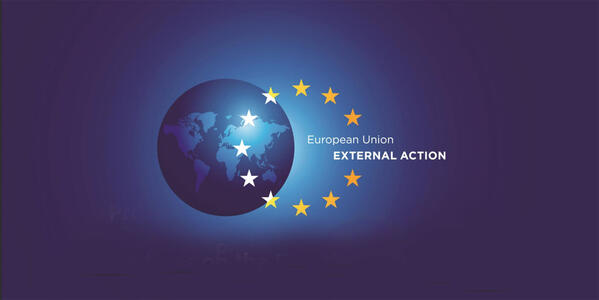How does the EU cooperate with its partners?

What are the EU’s goals?
The European Union European Union In 1957, Germany was one of the six founding members of today’s EU, along with France, Italy, Belgium, the Netherlands and Luxembourg. The EU is currently made up of 27 states; the euro is the official currency in 20 of them. For Germany, European integration forms the basis for peace, security and… Read more › pursues the goal of creating a stable, secure and prosperous common area within its outer borders. This also includes maintaining close and friendly relations with the EU’s immediate neighbours, and this is likewise a key element of German foreign policy.
What is the European Neighbourhood Policy (ENP)?
Since 2004, the EU has pursued a systematic “European Neighbourhood Policy” (ENP) oriented towards its neighbouring states to the east and south. There are two groups of states, to each of which several countries belong: the “Eastern Partnership” and the “Union for the Mediterranean”.
Both operate under the umbrella of the ENP and each have their own bodies and objectives. The fundamental goal of European Neighbourhood Policy is to support partner countries with modernisation and stabilisation projects and especially with implementing constitutional and democratic reforms.
How has the EU’s Eastern Partnership changed as a result of the Russian war of aggression against Ukraine?
The environment for the EU’s Eastern Partnership changed hugely following Russia’s invasion of Ukraine in February 2022. Three countries - Ukraine, Moldova and Georgia - applied for membership of the European Union. Accession negotiations are already underway with Ukraine and Moldova. Germany supports the admission of the two countries.
The European Neighbourhood Policy (ENP) should not be confused with the EU’s enlargement policy, however. The ENP involves no decision being made in advance about any potential EU accession; rather it is a means of maintaining conducive relations with neighbouring states and thereby creating stability in the EU’s neighbourhood. This involves the European Union European Union In 1957, Germany was one of the six founding members of today’s EU, along with France, Italy, Belgium, the Netherlands and Luxembourg. The EU is currently made up of 27 states; the euro is the official currency in 20 of them. For Germany, European integration forms the basis for peace, security and… Read more › offering its neighbours a privileged partnership, provided that both sides commit to values such as democracy, human rights Human rights The respect and strengthening of human rights worldwide are a cornerstone of German Federal Government policy. Together with its EU partners it is committed to protecting and continually advancing human rights standards throughout the world. This occurs in close collaboration with the institutions… Read more › and the rule of law.
The ENP also supports implementation of these action plans by providing financial resources and technical cooperation. In doing so, the neighbourhood policy follows the principles of “more for more”: those who do more to promote the expansion of democratic reforms and liberal societies receive more support.
How does the EU work with Africa?
The European Union European Union In 1957, Germany was one of the six founding members of today’s EU, along with France, Italy, Belgium, the Netherlands and Luxembourg. The EU is currently made up of 27 states; the euro is the official currency in 20 of them. For Germany, European integration forms the basis for peace, security and… Read more › attaches high priority to cooperation with the neighbouring continent of Africa. In 2022, the leaders of the EU and the African Union agreed on a common vision for the partnership going forward. The objectives here are solidarity, security, peace, prosperity and sustainable and continuous economic development for the citizens of the African Union and the European Union. The partnership aims to bring together people, regions and organisations.
The Federal Government Federal Government The Federal Government and cabinet is made up of the Federal Chancellor and the Federal Ministers. While the Chancellor holds the power to issue directives, the ministers have departmental powers, meaning that they independently run their respective ministries in the framework of those directives… Read more › is pushing for greater economic cooperation with Africa, and especially cooperation in the energy sector. To this end, the Federal Government is for example providing four billion euros until 2030 to support an EU-African green energy initiative.


